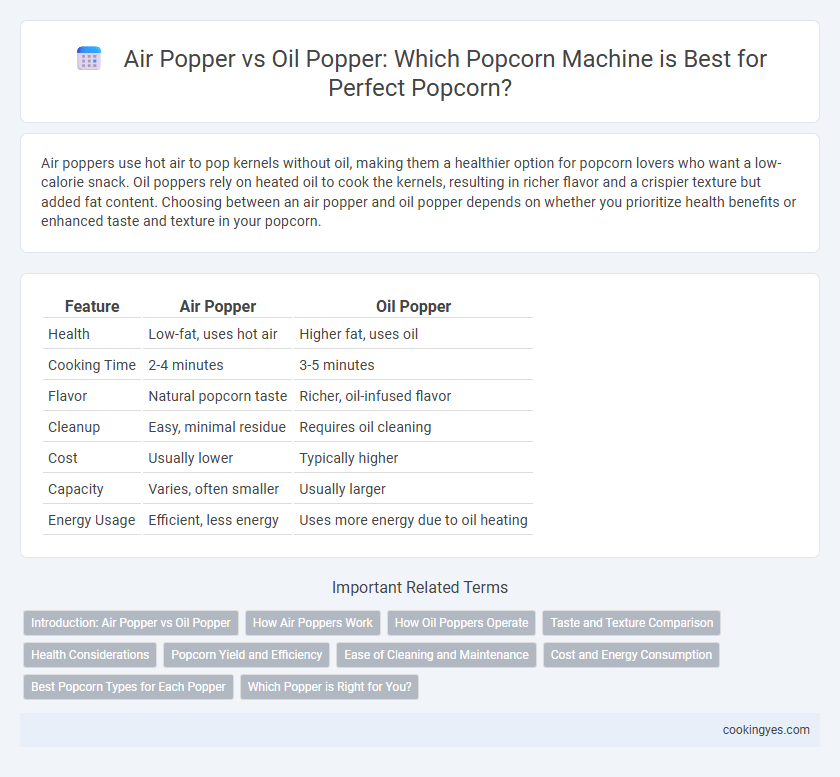Air poppers use hot air to pop kernels without oil, making them a healthier option for popcorn lovers who want a low-calorie snack. Oil poppers rely on heated oil to cook the kernels, resulting in richer flavor and a crispier texture but added fat content. Choosing between an air popper and oil popper depends on whether you prioritize health benefits or enhanced taste and texture in your popcorn.
Table of Comparison
| Feature | Air Popper | Oil Popper |
|---|---|---|
| Health | Low-fat, uses hot air | Higher fat, uses oil |
| Cooking Time | 2-4 minutes | 3-5 minutes |
| Flavor | Natural popcorn taste | Richer, oil-infused flavor |
| Cleanup | Easy, minimal residue | Requires oil cleaning |
| Cost | Usually lower | Typically higher |
| Capacity | Varies, often smaller | Usually larger |
| Energy Usage | Efficient, less energy | Uses more energy due to oil heating |
Introduction: Air Popper vs Oil Popper
Air poppers use hot air to pop kernels without oil, producing low-calorie, healthier popcorn with a light texture. Oil poppers cook kernels in heated oil, resulting in richer flavor and a crispier bite but higher fat content. Choosing between an air popper and oil popper depends on dietary preferences and desired taste profile.
How Air Poppers Work
Air poppers use hot air circulation to heat popcorn kernels evenly, causing them to pop without the need for oil. This method results in a healthier, low-calorie snack by eliminating added fats while preserving the popcorn's natural flavor and texture. Air poppers also typically offer faster cooking times and easier cleanup compared to oil-based popcorn machines.
How Oil Poppers Operate
Oil poppers operate by heating a small amount of oil inside the machine, which distributes heat evenly around the popcorn kernels, resulting in a richer flavor and a crispier texture. The oil not only facilitates uniform popping but also helps the seasoning adhere better to the popcorn compared to air-popped varieties. This method typically requires slightly more cleanup and adds calories but enhances the overall taste and mouthfeel of the popcorn.
Taste and Texture Comparison
Air poppers produce popcorn with a light, fluffy texture and a clean, natural flavor since they use hot air instead of oil. Oil poppers create a richer taste and crunchier texture due to the oil coating, which also enhances flavor absorption from seasonings. The choice between air and oil popping significantly impacts the sensory experience of popcorn, with air poppers favoring health-conscious taste and oil poppers catering to those who prefer a more indulgent, savory snack.
Health Considerations
Air poppers use hot air to pop kernels without added fats, resulting in lower calorie and fat content, making them a healthier choice for those watching their diet. Oil poppers require oil, which adds extra calories and may contribute to higher saturated fat intake depending on the oil type used. Choosing an air popper reduces the risk of unhealthy fat consumption and supports a heart-healthy snacking option.
Popcorn Yield and Efficiency
Air poppers produce popcorn by rapidly heating kernels with hot air, resulting in a higher yield of fully popped, low-moisture popcorn with minimal unpopped kernels, maximizing efficiency for healthy snacking. Oil poppers use heated oil to pop kernels, which can enhance flavor and texture but typically yield slightly fewer popped kernels due to the oil's impact on heat distribution and moisture retention. Overall, air poppers offer superior popcorn yield and energy efficiency, making them ideal for those prioritizing volume and health.
Ease of Cleaning and Maintenance
Air poppers are generally easier to clean and maintain because they use hot air to pop kernels, leaving little to no oily residue inside the machine. Oil poppers require regular cleaning of oil buildup and residue, which can be more time-consuming and may need special degreasers to maintain optimal performance. Choosing an air popper reduces the risk of clogged vents and simplifies maintenance routines, making it ideal for hassle-free popcorn preparation.
Cost and Energy Consumption
Air poppers for popcorn typically cost less upfront and consume significantly less energy, using hot air to pop kernels without oil. Oil poppers generally require higher energy consumption to heat both the oil and kernels, resulting in increased operational costs over time. Choosing an air popper offers a more cost-effective and energy-efficient solution for frequent popcorn preparation.
Best Popcorn Types for Each Popper
Air poppers produce light, low-calorie popcorn best suited for kernels with a high hull integrity and moisture content between 13-14%, such as Butterfly popcorn, which expands fully without burning. Oil poppers excel with larger, denser Mushroom kernels that absorb oil evenly, resulting in a crunchy, flavorful popcorn ideal for coatings and seasoning. Selecting the kernel type based on popper method enhances texture, taste, and overall popping efficiency.
Which Popper is Right for You?
Air poppers use hot air to pop kernels without oil, resulting in lower fat and calories, ideal for health-conscious individuals. Oil poppers coat kernels in oil during popping, enhancing flavor and texture, suitable for richer, buttery popcorn lovers. Choosing between air and oil poppers depends on dietary preferences, desired taste, and texture for the perfect popcorn experience.
Air popper vs Oil popper for popcorn machine Infographic

 cookingyes.com
cookingyes.com